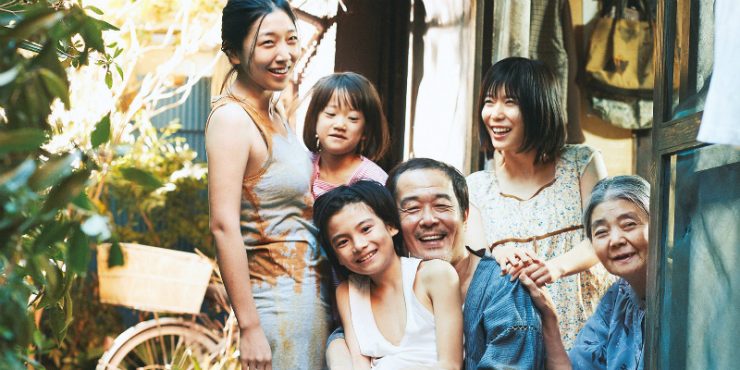Winning the Palme D’or at the Cannes Film Festival earlier in 2018 seemed like a crowning moment for internationally-renowned film director Hirokazu Kore-eda. His latest film, Shoplifters, won the top prize at the festival, but unlike the Academy Awards, Cannes rarely factors in career achievement (though they do have favorites), and it seems perfect that Kore-eda would get special consideration, not simply because his career is as good as anyone in the film industry, but also because he has made one of the very best movies of the year.
The film stars Kore-eda regular Kirin Kiki as Hatsue, a widow living off her pension in a small, rickety house in downtown Tokyo. She lives with a motley crew of petty thieves and sex workers, including Osamu (Lily Franky) who works in construction but enjoys shoplifting, Nobuyo (Sakura Ando) Osamu’s sometimes lover, Aki (Mayu Matsuoka) an erotic performer, and the young Shota (Kairi Jö), Osamu’s shoplifiting protegé. Osamu and Shota discover Yuri (Miyu Sasaki), a five-year-old girl, locked outside during a cold winter night. The quiet child doesn’t speak much, but accepts Osamu’s offer of a croquette to eat, and eventually also accepts his offer to come stay the night at their home where it’s warm.
Noticing the bruises and burn scars on the young Yuri’s arms, this unconventional family decides to keep Yuri, making her a new member of their crew, and a helpful participant in their petty crimes. They all take Hatsue’s family name, Shibata, and Osamu asks Shota to call him ‘Dad’, hoping to co-exist as a true family unit in order to make their economic survival more stable. Yuri’s entrance into the Shibata clan is seamless for the most part. The young girl doesn’t appear to miss her old home, and with the references to child abuse form her actual parents, she seems more than happy to accept the love that this new family has to offer.
Like all of Kore-eda’s films, Shoplifters is a bittersweet, slice-of-life drama that often recalls the very best of Mike Leigh or Kenneth Lonergan. The stark, direct nature of his directing style is consistently brilliant, expressive and intelligent while still making his cast of characters the focal point of the story. He often gets precise, melancholy performances, and is so skilled at working within ensembles and actors of any age. Shoplifters‘ sordid group of mercurial thieves may be the most compelling people I’ve seen in a movie this year, and the film itself feels like watching a great artist at the peak of his talents, a culmination of his entire scope routed simply into a single, uncomplicated film.
In the film’s second half, the Shibata paradise begins to crumble, and they face obstacles that could possibly lead to division. Yuri becomes a news story with her extended absence, while Osamu and Nobuyo lose their already meager jobs putting further stress on the family’s tight money situation. All the while, Hatsue’s own mischievous ways of making money are starting to spread thin. It’s the perspective of Shota and Yuri that gives Shoplifters the most pop, as the two young children must learn quickly about the desperate lifestyle they have recently accepted, and the learning curve can be devastating.
Kore-eda is an expert of finding charm and beauty within incredible pain, and the third act of Shoplifters certainly gives him plenty of opportunity to work within that realm. But at his best, Kore-eda can always make films that feel like miracles. After Life and Still Walking are amongst the best films that I have ever seen, and Shoplifters belongs amongst that crowd. It’s a piece of work that reminds you as an audience member (or, in my case, a jaded frequent moviegoer) that certain people can still make something that approaches grace, and can craft a film that is generous with its characters and feelings, while still requiring some expectation out of the viewer. It’s a film that asks for empathy and gives you little leeway to refuse, but it becomes so that you’re more than happy to provide it.
Written and Directed by Hirokazu Kore-eda










